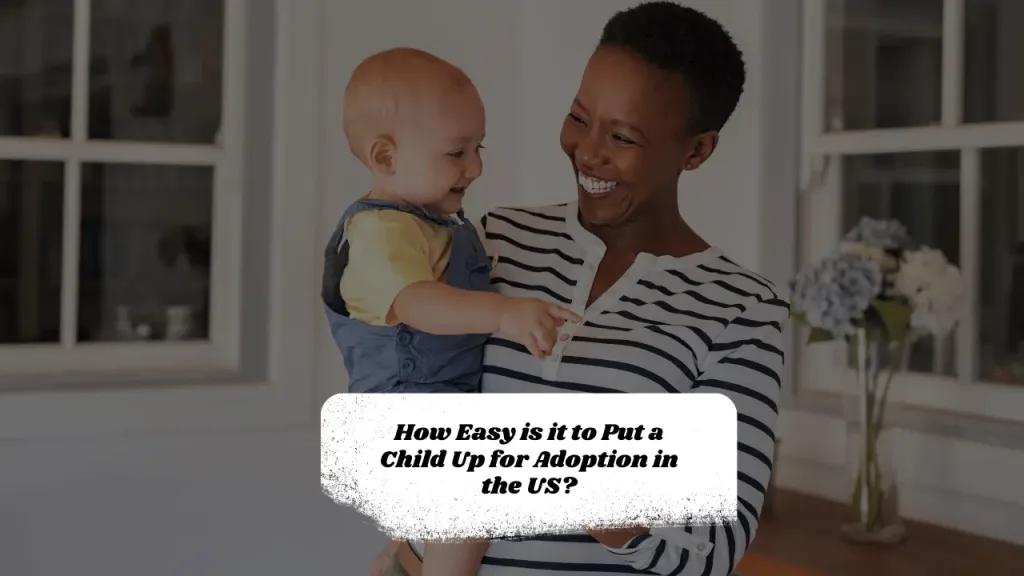How Easy is it to Put a Child Up for Adoption in the US?
Placing a child for adoption is a structured process, but it is not easy. While adoption can offer birth parents an opportunity to provide their child with a better life, the decision involves legal, emotional, and practical complexities. Here’s a breakdown of the adoption process, legal considerations, challenges, and answers to frequently asked questions.
Table of Contents
Steps to Put a Child Up for Adoption
1. Deciding to Place a Child for Adoption
The first step is deciding whether adoption is the right choice. Birth parents often get counseling and support from adoption agencies before making this decision.
2. Choosing the Type of Adoption
Birth parents must decide between:
- Open Adoption: Ongoing contact with the adoptive family.
- Closed Adoption: No contact post-adoption.
The choice depends on the birth parents’ preferences and what they feel comfortable with.
3. Consent to Adoption
After the child is born, the birth mother must legally consent to the adoption. In some states, the birth father must also provide consent if he has established paternity.
4. Choosing an Adoption Agency
Birth parents can work with an adoption agency or choose a private adoption. Agencies provide services like counseling, legal support, and matching with adoptive families.
5. Home Study and Background Check
Adoptive parents undergo a home study to assess their ability to provide a stable environment for the child. This process includes background checks and interviews.
6. Legal Process and Finalization
The finalization of the adoption involves legal steps in court, where the adoptive parents’ parental rights are officially recognized. This process can take several months.
Related Articles for You:
How to Get Custody of a Child If Both Parents Are Unfit?
How Long Does a Foster Child Adoption Take?

Legal Considerations
Paternity and Birth Father Rights
The birth father must consent if he is involved in the child’s life or has legally acknowledged paternity. If not, his rights may be limited.
State Laws
Adoption laws vary by state, affecting aspects like consent and waiting periods. Birth parents should familiarize themselves with state-specific regulations.
Emotional Considerations
Placing a child for adoption is emotionally challenging. Many birth parents experience grief and loss. Counseling services through adoption agencies can help manage these emotions and provide support throughout the process.
Challenges of Placing a Child for Adoption
- Emotional Toll: The decision to place a child for adoption is emotionally taxing, and the process can bring feelings of grief and loss.
- Legal Complexities: Adoption laws vary, and understanding the legal requirements for consent and revocation can be difficult without legal help.
- Uncertainty: Birth parents may feel uncertain about their future relationship with the child, especially in open adoption situations.
- Costs: Depending on the adoption type, there can be significant costs involved, including agency fees and medical expenses.
FAQs about Adoption in the U.S.
Can I change my mind after placing my child for adoption?
Yes, in most states, there is a short period after consent where the birth parent can revoke consent. This varies by state.
How long does the adoption process take?
The process typically takes several months from placement to finalization, but the timeline depends on state laws and the type of adoption.
Can I choose the adoptive family?
Yes, in open adoption, birth parents can choose the adoptive family based on preferences provided by the adoption agency.
Can the birth father stop the adoption?
If the birth father has legal rights and is involved, he can prevent the adoption unless he consents.
Can I still have contact with my child after adoption?
In open adoption, contact may be agreed upon. The level of contact is determined before the adoption.
Conclusion
Placing a child for adoption in the U.S. is a structured but emotionally challenging process. Birth parents must address legal requirements, emotional complexities, and state-specific laws. While adoption can provide a better future for the child, birth parents should carefully consider the emotional and legal implications of their decision.
About the Author

Sarah Klein, JD, is a former family law attorney with over a decade of courtroom and mediation experience. She has represented clients in divorce, custody cases, adoption, Alimony, and domestic violence cases across multiple U.S. jurisdictions.
At All About Lawyer, Sarah now uses her deep legal background to create easy-to-understand guides that help families navigate the legal system with clarity and confidence.
Every article is based on her real-world legal experience and reviewed to reflect current laws.
Read more about Sarah
